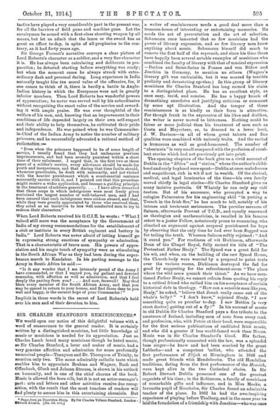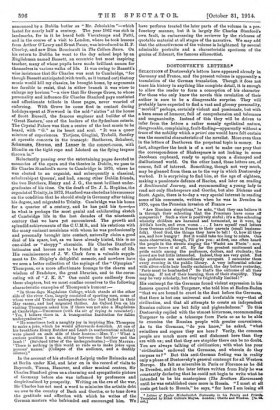SIR CHARLES STANFORD'S REMINISCENCES.*
WE would open our notice of this delightful volume with a word of reassurance to the general reader. It is certainly written by a distinguished musician, but little knowledge of music or musicians is needed for its appreciation. Just as Charles Lamb loved many musicians though he hated music, so Sir Charles Stanford, a lover and maker of music, had a very genuine affection and admiration for some profoundly unmusical people—Tennyson and Dr. Thompson of Trinity, to mention only two. The same admirably catholic taste which enables him to appreciate Brahms and Wagner, Bach and Offenbach, Gluck and Johann Strauss, is shown in his outlook an humanity, and is one of the chief charms of the book. Music is allowed the beau rile, but it is not an actor-manager's part : arts and letters and other activities receive due recog- nition, with the result that the most tuneless of readers will End plenty to amuse him in this entertaining chronicle. But * Pages from an Unwritten Diary. By Sir Charles Villiers Stanford. London: Zdwarcl Arnold. Lt.'s. 6d. net.] a writer of reminiscences needs a. good deal more than a treasure-house of interesting or entertaining memories. He needs the art of presentation and the art of selection. Schumann once lamented that so few musicians had the power of literary expression, and so few literary men knew anything about music. Schumann himself did much to remove the first half of the reproach, and since his time there have happily been several notable examples of musicians who combined the faculty of literary with that of musical expression —Berlioz and Saint-Sains in France and von Billow and Joachim in Germany, to mention no others. (Wagner's literary gift was undeniable, but it was marred by terrible prolixity and devastating egotism.) In this group of literary musicians Sir Charles Stanford has long earned his claim to a distinguished place. He has an excellent style, at once easy, lucid, and concise. He has a happy knack of dramatizing anecdotes and justifying criticism or comment by some apt illustration. And the temper of these reminiscences is as kindly as their form is attractive. For though frank in the expression of his likes and dislikes, the writer is never moved to bitterness. Nothing could be fairer or more judicial than his treatment of men such as Costa and Meyerbeer, or, to descend to a lower level, J. W. Davison—in all of whom great talents and fine qualities were combined with unlovely traits. And the recital is humorous as well as good-humoured. The number of "chestnuts "is very small compared with the profusion of excel- lent stories which had not previously got into print.
The opening chapters of the book give us a vivid account of Dublin in the " fifties " and "sixties," where the author's child- hood and early boyhood were spent—Dublin at once malodorous and magnificent, rich in wit if not in wealth. Of the clerical, medical, and legal luminaries of the time—his own family moved chiefly in legal circles—Sir Charles Stanford gives us many incisive portraits. Of Whately be can only say tridi taut urn. But of his successor, who prompted a wag to eulogize Palmerston for his engineering skill "in putting a Trench in the Irish See," he has much to tell, notably of his intense and irrelevant seriousness. The peculiar sarcasm of Salmon, afterwards Provost of T.c.D., and equally renowned as theologian and mathematician, is recalled in his famous retort to a junior Fellow, notoriously prone to romancing, who clinched an argument against corporal punishment for boys by observing that the only time he had ever been flogged was for telling the truth. Whereon Salmon softly rejoined : "And it cured you." For readiness of wit Dickinson, afterwards Dean of the Chapel Royal, fully earned his title of "The Protestant Father Healy." The Synod was a great field for his wit, and when, on the building of the new Synod House, the Church-body were worried by a proposal to paint texts over the various rooms, Dickinson destroyed the fad for good by suggesting for the refreshment-room "The place where the wild asses quench their thirst." As we have men- tioned Father Healy, we cannot refrain from quoting his reply to a critical friend who rallied him on his acceptance of certain historical data in theology. "How can a sensible man like you, Healy," he asked, "believe that Jonah really came out of the whale's belly?" "I don't know," rejoined Healy, "I saw something quite as peculiar to-day. I saw Meldon [a very stout doctor] getting out of a fly I" In his account of music in old Dublin Sir Charles Stanford pays a fine tribute to the amateurs of Ireland, including men of note from every rank and profession, who, with Petrie at their head, were responsible for the first serious publications of undiluted Irish music, and who did a greater if less world-famed work than Moore. Music was in Sir Charles Stanford's blood. His father, though professionally connected with the law, was a splendid bass singer—he knew and had been coached by the great Lablache—and a competent 'cellist, who attended the first performance of Elijah at Birmingham in 1846 and made great friends with Mendelssohn. The old Handelian traditions, dating from the first performance of the Messiah, were kept alive in the two Cathedral choirs. In Sir Robert Stewart Dublin possessed one of the greatest organists of his time ; in the Robinsons, a family of musicians of remarkable gifts and influence, and in Miss Meeke, a favourite pupil of Moscheles, Sir Charles found an admirable teacher of the piano. In 1862 he had the awe-inspiring experience of playing before Thalberg, and in the same year he laid the foundation of a friendship with Joachim—who was once
announced by a Dublin butler as "Mr. Jehoiakim "—which lasted for nearly half a century. The year 1862 was rich in landmarks, for in it he heard both Vieuxtemps and Patti, and in the course of a visit to London, where he took lessons from Arthur O'Leary and Ernst Pauer, was introduced to H. F. Chorley, and saw Dion Boucicault in The Colleen Baum. On his return to Dublin he went to the day school kept by an Englishman named Bassett, an eccentric but most inspiring teacher, many of whose pupils have made brilliant names for themselves in various walks of life. It was owing to Bassett's wise insistence that Sir Charles was sent to Cambridge, "for though Bassett anticipated (with truth, as it turned out) that my music would kill my classics, be brought home, by arguments too forcible to resist, that in either branch it was wiser to enlarge my horizon "—a view that Sir George Grove, to whose personality and influence Sir Charles Stanford pays unstinted and affectionate tribute in these pages, never wearied of enforcing. With Grove he came first in contact during holidays spent at Norwood in the mid-" sixties" at the house of Scott Russell, the famous engineer and builder of the 'Great Eastern,' one of the leaders of the Sydenham coterie. The Crystal Palace was then a centre of the best music to be beard, with "G." as its heart and soul. "It was a queer mixture of experiences. Tietjens, Giuglini, Trebelli, Santley
at operatic concerts in the transept: Beethoven, Schubert, Schumann, Strauss, and Lancer in the concert-room, with
Blondin on the tight rope and Leotard on the flying trapeze thrown in."
Reluctantly passing over the entertaining pages devoted to memories of the opera and the theatre in Dublin, we pass to Sir Charles Stanford's move to Cambridge in 1870, where he was elected to an organist, and subsequently a classical, scholarship at Queens', and had, among other Dublin friends, the two Butchers, Henry and J. G., the most brilliant under- graduates of his time. On the death of Dr. J. L. Hopkins, the organist of Trinity, in 1873, Stanford was elected as his successor on the condition that he should study in Germany after taking
his degree, and migrated to Trinity. Cambridge was his home for a quarter of a century, and he has paid his Opearlipm
in what is perhaps the most genial and exhilarating sketch of Cambridge life in the last decades of the nineteenth century that we have yet encountered. The growth and splendid achievements of the C.U.M.S., and his relations with the many eminent musicians with whom he was professionally and personally brought into contact, naturally claim a good deal of his space, but, as we have already hinted, this is no one-sided or " shoppy " chronicle. Sir Charles Stanford's intimates and heroes are to be found in all walks of life. His reminiscences of J. W. Clark form a valuable supple- ment to Dr. Shipley's delightful memoir, and nowhere have we seen a better collection of the sayings of the " Olympian " Thompson, or a more affectionate homage to the charm and -wisdom of Bradshaw, the great librarian, and to the corus- cating wit of "J. K. S." One could quote endlessly from these chapters, but we must confine ourselves to the following characteristic examples of Thompson's humour :—
" In those days Magdalene College, which stands at the other side of the river Cam, largely consisted of sporting men, some of whom were old Trinity undergraduates who had failed in their May exams., and had migrated thither. An Oxford Don on his visiting Thompson asked him if there was not also a Magdalene at Cambridge.—TnorarsoN (with the air of trying to remember) : 'Yes, I believe there is. A. transpontine Institution for fallen undergraduates.'" "He sometimes took a naughty joy in inspiring Mrs. Thompson to make a joke, which he would afterwards demolish. At one of his breakfasts Henry Butcher and Lamb (a mathematical scholar) were placed on each side of their hostess.—Mas. T.: What a curious position I am in, sitting between the butcher and the lamb !' (Subdued titter of the undergraduates.)—Tua MILSTEB: 'There is nothing in this world so rude as to make jokes upon persons' names.' (Collapse of the audience, and a deathly silence)."
In the account of his studies at Leipzig under Reinecke and at Berlin under Kiel, and later on in the record of visits to Bayreuth, Vienna, Hanover, and other musical centres, Sir Charles Stanford gives us a charming and sympathetic picture of Germany before she was inflamed by professors and despiritualized by prosperity. Writing on the eve of the war,
Sir Charles has not used a word to minimize the artistic debt we owe to the country of Bach and Goethe, or to tone down the gratitude and affection with which he writes of the German masters who befriended and encouraged him. We have perforce treated the later parts of the volume in a per- functory manner, but it is largely Sir Charles Stanford's own fault, in embarrassing the reviewer by the richness of quotable material at all stages of the narrative. We may add that the attractiveness of the volume is heightened by several admirable portraits and a characteristic specimen of the genius of Edouart, the famous silhouettist.



































 Previous page
Previous page